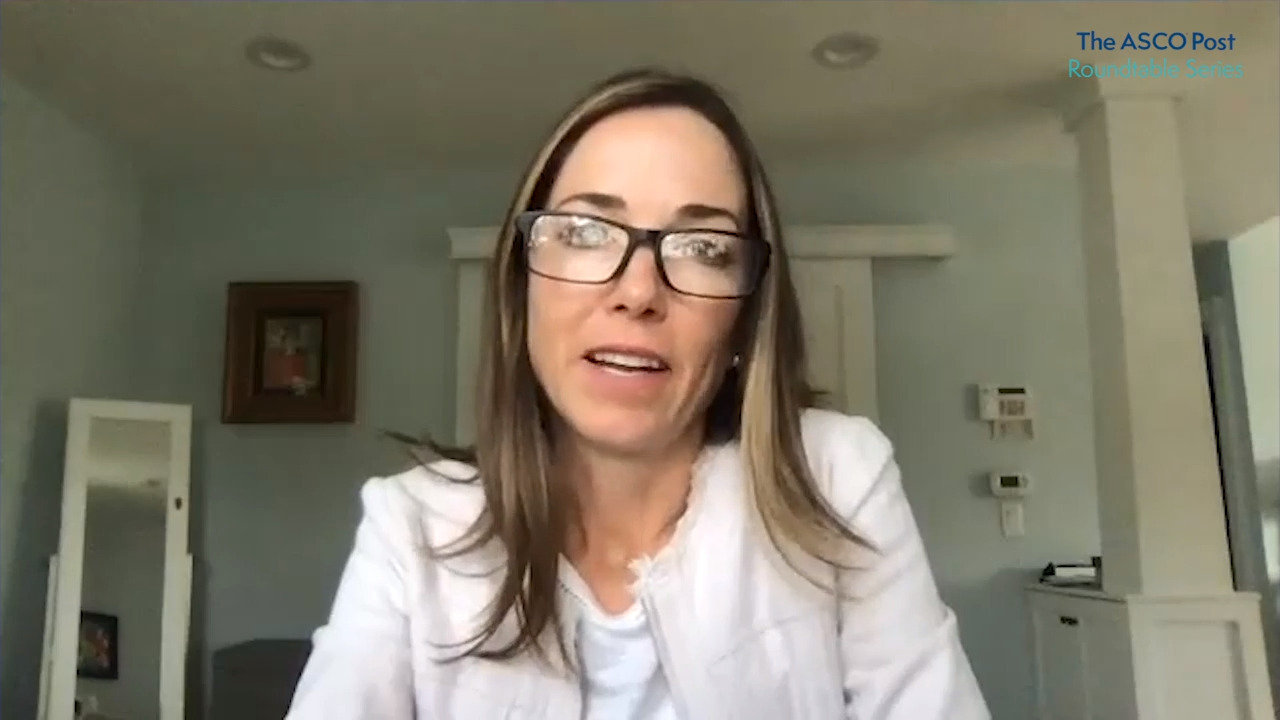Extended Follow-up of PALOMA-3 Supports Survival Benefit of Palbociclib Plus Fulvestrant in Advanced Breast Cancer
An updated analysis of the PALOMA-3 randomized, placebo-controlled trial demonstrated continued superiority for the combination of palbociclib (CDK4/6 inhibitor) plus fulvestrant over fulvestrant plus placebo in women with hormone receptor–positive, HER2-negative advanced breast cancer whose...
ADAPT Trial: ‘Excellent’ Outcomes Reported With Neoadjuvant Dual HER2 Therapy in Breast Cancer
The first overall survival analysis of the WGS-ADAPT HER2+/HR– study, which evaluated neoadjuvant therapy in patients with hormone receptor–negative, HER2-positive disease, showed that treatment with pertuzumab and trastuzumab plus paclitaxel—or with the chemotherapy-free regimen of...
Expert Point of View: Melinda Telli, MD
EA1131 study discussant, Melinda Telli, MD, Associate Professor of Medicine at Stanford University, Director of the Breast Cancer Program at the Stanford Cancer Institute, and Associate Director of the Stanford Women’s Cancer Center, commented: “At this point, capecitabine remains preferred as...
EA1131 Trial: Platinum Not Equal to Capecitabine for Residual Disease in Triple-Negative Breast Cancer
In patients with triple-negative breast cancer who have residual disease after neoadjuvant chemotherapy, adjuvant capecitabine remains the standard of care. In the multicenter randomized noninferiority EA1131 trial, which included primarily basal tumors, noninferiority of adjuvant platinum over...
Expert Point of View: Nadine M. Tung, MD
Formal discussant of the OlympiA trial, Nadine M. Tung, MD, Director of Breast Medical Oncology and the Cancer Genetics and Prevention Program at Beth Israel Deaconess Medical Center and Harvard Medical School, was enthusiastic about the ability of olaparib to improve invasive disease–free survival ...
OlympiA Trial: Adjuvant Olaparib Extends Disease-Free Survival in BRCA-Mutated Early Breast Cancer
Adjuvant therapy with the PARP inhibitor olaparib for 1 year extended disease-free survival in patients with high-risk early-stage HER2-negative breast cancer with BRCA1/2 germline (inherited) mutations, according to a prespecified interim analysis of the phase III OlympiA trial presented at the...
Effect of Mindfulness Meditation and Survivorship Education on Depressive Symptoms in Younger Breast Cancer Survivors
In a phase III trial (Pathways to Wellness) reported in the Journal of Clinical Oncology, Julienne E. Bower, PhD, and colleagues found that both mindfulness meditation and survivorship education interventions significantly reduced depressive symptoms in younger breast cancer survivors. Study...
Guideline Update Addresses Treatments for HER2-Negative Advanced Breast Cancer
In light of findings from multiple recent clinical trials in HER2-negative metastatic breast cancer, ASCO has revised its treatment recommendations to inform more evidence-based care for metastatic breast cancer.1 “This guideline update provides important clinical guidance about the new use of...
Cancer Is Trying to Steal My Body, but I Will Not Allow It to Steal My Joy
Until I was diagnosed with HER2-positive, estrogen receptor–positive/progesterone receptor–positive de novo metastatic breast cancer in 2009, I didn’t realize that Black women could get the disease. Although my mother died of metastatic breast cancer 5 years earlier when she was 65, she was the...
Pembrolizumab for High-Risk, Early-Stage Triple-Negative Breast Cancer
On July 26, 2021, pembrolizumab was approved for high-risk, early-stage, triple-negative breast cancer in combination with chemotherapy as neoadjuvant treatment and continued as adjuvant treatment.1 Pembrolizumab was also granted regular approval in combination with chemotherapy for locally...
Addition of Everolimus to Letrozole in Premenopausal Women With Advanced HR-Positive, HER2-Negative Breast Cancer
In the Chinese phase II MIRACLE trial reported in JAMA Oncology, Fan et al found that the addition of everolimus to letrozole significantly improved progression-free survival among premenopausal women with advanced hormone receptor (HR)-positive, HER2-negative breast cancer whose disease had...
Early-Stage Research on Dual-Action Estrogen Receptor Inhibitors for Breast Cancer
A set of compounds developed by scientists at Scripps Research target estrogen-sensitive breast cancer cells in new ways, potentially creating better options for patients with treatment-resistant cancers. More information on these dual-mechanism estrogen receptor inhibitors was published by Min et...
Evandro de Azambuja, MD, PhD, Comments on the BERENICE Trial
The invited discussant for the BERENICE trial was Evandro de Azambuja, MD, PhD, Head of the Medical Support Team at the Institut Jules Bordet in Brussels. He concluded from the study that pertuzumab plus trastuzumab, combined with an anthracycline/taxane regimen given every 2 weeks or every 3...
Safety, Efficacy of Neoadjuvant Pertuzumab Plus Trastuzumab Maintained in Final Analysis of BERENICE Trial
Long-term cardiac safety and efficacy have been confirmed for pertuzumab plus trastuzumab in patients with early breast cancer, in an update of the phase II BERENICE trial reported at the 2021 ESMO Breast Cancer Virtual Congress.1 Chau T. Dang, MD, of the Breast Medicine Service at Memorial Sloan...
Global Breast Cancer Survival: Estimated Impact of Scaling Up Access to Treatment/Imaging Modalities and Quality of Care
In a study reported in The Lancet Oncology, Ward et al estimated the improvements in global overall survival for female breast cancer that could be achieved via increased availability of treatment and imaging modalities, as well as improvements in quality of care. Study Details The study used a...
Pharmacologic Cardioprotection in Women With Nonmetastatic Breast Cancer Receiving Anthracycline-Based Chemotherapy
In an interim analysis of the Italian phase III SAFE trial reported in JAMA Oncology, Livi et al found that a cardioprotective strategy using ramipril and/or bisoprolol reduced the risk of myocardial dysfunction in women with nonmetastatic breast cancer receiving anthracycline-based chemotherapy....
Update on U.S. Indication for Atezolizumab in PD-L1–Positive Metastatic Triple-Negative Breast Cancer
Genentech, a member of the Roche Group, announced that it has made the decision to voluntarily withdraw the U.S. accelerated approval for atezolizumab (Tecentriq) in combination with nab-paclitaxel for the treatment of adults with unresectable locally advanced or metastatic triple-negative breast...
Study Finds Drop in Breast Cancer Screening Rates in Low-Income Communities During the COVID-19 Pandemic
A new study found that during the COVID-19 pandemic, breast cancer screening rates declined among women aged 50 to 74 years at 32 community health centers that serve lower-income populations in the United States. The report, published by Stacey A. Fedewa, PhD, and colleagues in the journal Cancer,...
Does Radiotherapy Reduce the Long-Term Risk of Ipsilateral Breast Recurrence in Women With DCIS Who Underwent Lumpectomy?
In an analysis of long-term outcomes from the phase III NRG/RTOG 9804 trial reported in the Journal of Clinical Oncology, Beryl McCormick, MD, and colleagues found that whole-breast irradiation vs observation was associated with reduced risk of all and invasive ipsilateral breast recurrence at 15...
I’m a Two-Time Breast Cancer Survivor, and the Experience Has Been Life-Altering
Even before my breast cancer diagnosis in early 2002, the year was shaping up to be life-altering for me and my family. We had moved from Seattle to Houston for a new career opportunity for my husband and were just settling into our new home when I felt a pea-sized nodule in my left breast during a ...
Sacituzumab Govitecan-hziy for Locally Advanced or Metastatic Triple-Negative Breast Cancer
On April 7, 2021, sacituzumab govitecan-hziy was granted regular approval for treatment of patients with unresectable locally advanced or metastatic triple-negative breast cancer who have received two or more prior systemic therapies, at least one of them for metastatic disease.1 Sacituzumab...
New Guideline Provides Clarity on Timing, Treatment of Axilla in Early-Stage Breast Cancer
ASCO and Ontario Health (Cancer Care Ontario) have collaborated to release a new clinical practice guideline on the management of the axilla in early-stage breast cancer.1 “A lot has changed in the past several years with regard to de-escalating the amount of treatment women are offered in the...
Historic, Present, and Future Perspectives on Breast Cancer in Egypt
Breast cancer is the most frequently diagnosed cancer among women around the world, making it a significant public health problem.1 The disease affects both men and women, although it is rare in men, accounting for just 1% of all breast cancer diagnoses in the United States and less than 0.1% of...
Extended Follow-up of PALOMA-3 Supports Survival Benefit of Palbociclib Plus Fulvestrant in Advanced Breast Cancer
An updated analysis of the PALOMA-3 randomized, placebo-controlled trial demonstrated continued superiority for the combination of palbociclib (CDK4/6 inhibitor) plus fulvestrant over fulvestrant plus placebo in women with hormone receptor–positive, HER2-negative advanced breast cancer whose...
Caution With Robotically Assisted Surgical Devices for Mastectomy: FDA Safety Communication
The U.S. Food and Drug Administration (FDA) is reminding patients and health-care providers that the safety and effectiveness of robotically assisted surgical devices for use in mastectomy procedures or in the prevention or treatment of breast cancer have not been established. In addition, the FDA...
Physical Activity and Cognitive Function Before, During, and After Chemotherapy for Breast Cancer
In a study reported in the Journal of Clinical Oncology, Elizabeth A. Salerno, PhD, MPH, and colleagues found that higher levels of physical activity before and during chemotherapy in women with early-stage breast cancer was associated with better cognitive function outcomes at up to 6 months...
Prediction Models May Reduce False-Positives in Women With Dense Breasts Undergoing MRI Screening
Prediction models based on clinical characteristics and imaging findings may help reduce the false-positive rate in women with dense breasts who undergo supplemental breast cancer screening with magnetic resonance imaging (MRI), according to a study published by den Dekker et al in the journal...
Study Identifies Potential Mechanisms of Resistance to Sacituzumab Govitecan-hziy in Patients With Triple-Negative Breast Cancer
Researchers have determined how a highly aggressive type of breast cancer may evade treatment with the compound sacituzumab govitecan-hziy, according to findings published by Coates et al in Cancer Discovery. Their results could help improve therapy and ultimately prolong survival for patients with ...
Simulation Model–Based Clinical Decision Tool for Predicting Benefit of Adjuvant Chemoendocrine vs Endocrine Therapy in HR-Positive, HER2-Negative Breast Cancer
As reported in the Journal of Clinical Oncology, Jayasekera et al have developed a clinical decision tool called BTxChoice that can be used with or without the 21-gene recurrence score to estimate the potential benefit of adjuvant chemoendocrine vs endocrine therapy in women with node-negative,...
Addition of Entinostat to Exemestane in Aromatase Inhibitor–Resistant, HR-Positive, HER2-Negative Advanced Breast Cancer
As reported in the Journal of Clinical Oncology by Roisin M. Connolly, MB, BCh, MD, and colleagues, the phase III ECOG-ACRIN Cancer Research Group E2112 trial showed no significant improvement in progression-free or overall survival with the addition of the histone deacetylase inhibitor entinostat...
Meta-analysis of Outcomes With the Addition of Adjuvant Trastuzumab to Chemotherapy for HER2-Positive Breast Cancer
In a study conducted by the Early Breast Cancer Trialists’ Collaborative Group and reported in The Lancet Oncology by Bradley et al, an individual patient data meta-analysis of randomized trials has shown that the addition of adjuvant trastuzumab to chemotherapy reduces the risk of disease...
Evaluation of Baseline Cancer Mortality Risk in Medicaid Expansion and Nonexpansion States
In a study of National Cancer Database data reported in a research letter in JAMA Oncology, Salazar et al found little difference in baseline cancer mortality rates between U.S. states that expanded Medicaid enrollment and nonexpansion states prior to expansion in 2009 and immediately following...
Outcomes and Behaviors Among Women Receiving or Declining Their Breast Cancer Polygenic Risk Score
A recent study examined patient-reported outcomes and risk-management behaviors of women choosing to receive or decline their breast cancer polygenic risk scores (PRS). The findings were published by Tatiane Yanes, PhD, and colleagues in Genetics in Medicine. The research aimed to look at how the...
Expert Point of View: Melinda L. Telli, MD
The invited discussant of GeparNuevo,1 Melinda L. Telli, MD, Associate Professor of Medicine at Stanford University School of Medicine, Director of the Breast Cancer Program at the Stanford Cancer Institute, and Associate Director of the Stanford Women’s Cancer Center, welcomed the additional data...
Neoadjuvant Durvalumab Improves Long-Term Outcomes in the GeparNuevo Trial
In the phase II GeparNuevo trial, patients with early triple-negative breast cancer receiving the PD-L1 inhibitor durvalumab in addition to chemotherapy as neoadjuvant therapy saw improvements in long-term outcomes. The results were presented at the 2021 ASCO Annual Meeting by Sibylle Loibl, MD,...
A New Era of Hope for Patients With Triple-Negative Breast Cancer
Triple-negative breast cancer is a particularly devastating subtype of breast cancer, as it is often diagnosed in young women and is associated with an exceptionally poor prognosis. The “triple-negative” designation indicates that the three key features driving most breast cancers (estrogen...
Outcomes With 2 vs 5 Years of Hormone Therapy Following Adjuvant Endocrine Therapy in Postmenopausal Women With HR-Positive Breast Cancer
In a phase III trial reported in The New England Journal of Medicine, Michael Gnant, MD, and colleagues found no difference in disease-free survival with 2 vs 5 years of treatment with the aromatase inhibitor anastrozole in postmenopausal women with early hormone receptor (HR)-positive breast...
Use of Statins and Survival Outcomes Among Patients With Triple-Negative Breast Cancer
A study published by Nowakowska et al in the journal Cancer has found a significant association between the use of cholesterol-lowering statins and survival rates of patients with triple-negative breast cancer. Since statins are relatively inexpensive, easy to access, and produce minimal side...
Racial/Ethnic Disparities in Emergency Department Visits After Breast Cancer Surgery
Among women undergoing surgery for breast cancer, up to 13% will have a postoperative visit to an emergency department, according to recent research. A new study published by Falcone et al in Breast Cancer Research and Treatment discovered there is a greater likelihood that Hispanic and...
KEYNOTE-522: Neoadjuvant Pembrolizumab Improves Event-Free Survival in Triple-Negative Breast Cancer
The latest analysis of the pivotal phase III KEYNOTE-522 trial demonstrated significant improvements in clinical outcomes with pembrolizumab plus chemotherapy vs chemotherapy alone as a neoadjuvant/adjuvant treatment of triple-negative breast cancer.1 This is the first large, randomized, phase III...
Incidence of Axillary Adenopathy in Screening or Diagnostic Mammography After COVID-19 Vaccination
In a single-center retrospective study reported in a research letter in JAMA Oncology, Robinson et al found a vaccine-related axillary adenopathy incidence rate of 3% among women undergoing screening or diagnostic mammography within 90 days of receipt of at least one dose of a COVID-19 vaccine....
Risk of Breast Cancer in Women Older Than Age 65 With Germline Pathogenic Variants in Predisposition Genes
In a study reported in the Journal of Clinical Oncology, Boddicker et al found that women older than age 65 in the general population who carry germline pathogenic variants in established high-risk breast cancer predisposition genes remain at significant risk of late-onset breast cancer and should...
Single-Agent Talazoparib Shows Activity in the Neoadjuvant Treatment of Triple-Negative Breast Cancer
For the neoadjuvant treatment of triple-negative breast cancer, the oral poly (ADP-ribose) polymerase (PARP) inhibitor talazoparib yielded promising pathologic complete response rates in the phase II single-arm NEOTALA trial presented at the 2021 ASCO Annual Meeting.1 Preoperative chemotherapy is...
Study Explores Rates of Reconstruction for Women With Inflammatory Breast Cancer Undergoing Mastectomy
The percentage of patients with inflammatory breast cancer who select reconstructive surgery after mastectomy—whether immediate or delayed—remains low in spite of improvements in treatment and long-term survival, but the numbers are increasing, according to recent research published by Karadsheh et ...
Expert Point of View: Evandro de Azambuja, MD, PhD
“KAITLIN didnot meet its primary endpoint, either in the intent-to-treat or node-positive population,1 but in context with the APHINITY trial [1 year of adjuvant pertuzumab/trastuzumab plus chemotherapy],2 whose outcomes were similar at 3 years, you can appreciate that both arms did extremely...
KAITLIN Trial: No Subgroup Benefits More From T-DM1 Plus Chemotherapy for HER2-Positive Early Breast Cancer
In the phase III KAITLIN trial, replacing adjuvant taxane and trastuzumab with ado-trastuzumab emtansine (T-DM1) did not result in a significant improvement in invasive disease–free survival in the node-positive or intent-to-treat population of women with high-risk, HER2-positive early breast...
FDA Approves Pembrolizumab in Combination for High-Risk, Early-Stage Triple-Negative Breast Cancer
On July 26, the U.S. Food and Drug Administration (FDA) approved pembrolizumab (Keytruda) for high-risk, early-stage triple-negative breast cancer in combination with chemotherapy as a neoadjuvant treatment, and then continued as a single agent as adjuvant treatment after surgery. The FDA also...
HR-Positive/HER2-Positive Metastatic Breast Cancer
In this video, Drs. Sara A. Hurvitz, William J. Gradishar, and Sara M. Tolaney discuss the current treatment landscape for hormone receptor (HR)-positive, HER-positive metastatic breast cancer. Dr. Hurvitz presents the case of a 34-year-old woman with de novo metastatic estrogen receptor/progesterone receptor–positive, HER2-positive breast cancer that has metastasized to the liver, bones, and lungs. The faculty discuss the optimal first-line treatment strategy for this patient and review the data surrounding the use of different dual HER2-directed therapies.
ER-Positive/HER2-Positive Breast Cancer and Residual Disease
In this video, Drs. Sara A. Hurvitz, William J. Gradishar, and Sara M. Tolaney turn their discussion to treatment options for HER2-positive breast cancer. Dr. Hurvitz presents a case of a 62-year-old woman diagnosed with high-grade cT1N1 estrogen receptor (ER)-positive/progesterone receptor–negative, HER2-positive breast cancer. The faculty discuss whether anthracycline-based regimens should still be utilized in the neoadjuvant setting and the role of T-DM1 as adjuvant therapy for residual disease.
HR-Positive/HER2-Negative Early Breast Cancer
In this video, Drs. Sara A. Hurvitz, William J. Gradishar, and Sara M. Tolaney discuss the management of hormone receptor (HR)-positive, HER2-negative early breast cancer. The faculty present the case of a 54-year-old perimenopausal Black woman who has been diagnosed with high-grade T3N1 left breast cancer that is estrogen receptor–positive, progesterone receptor–negative, and HER2-negative. They discuss the utility of genomic assays in helping guide selection of endocrine therapy vs chemotherapy, as well as the use of adjuvant CDK4/6 inhibitors such as palbociclib, abemaciclib, and ribociclib.



